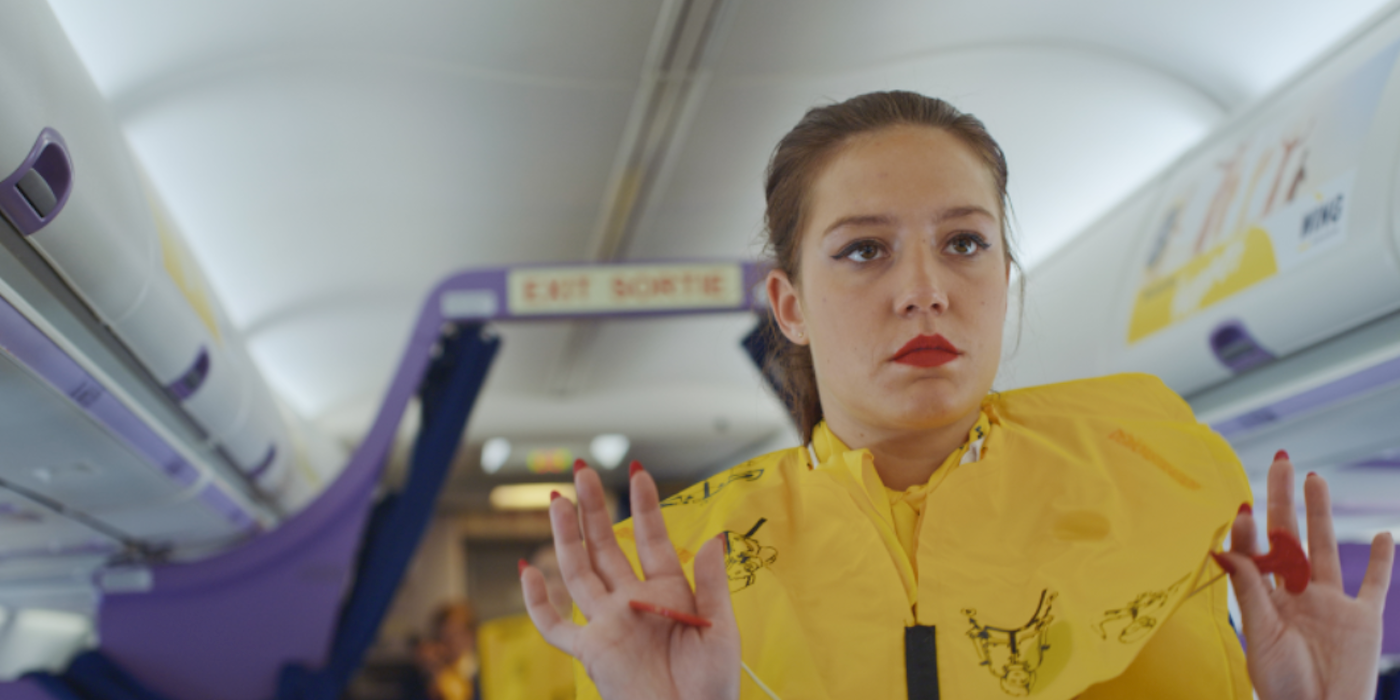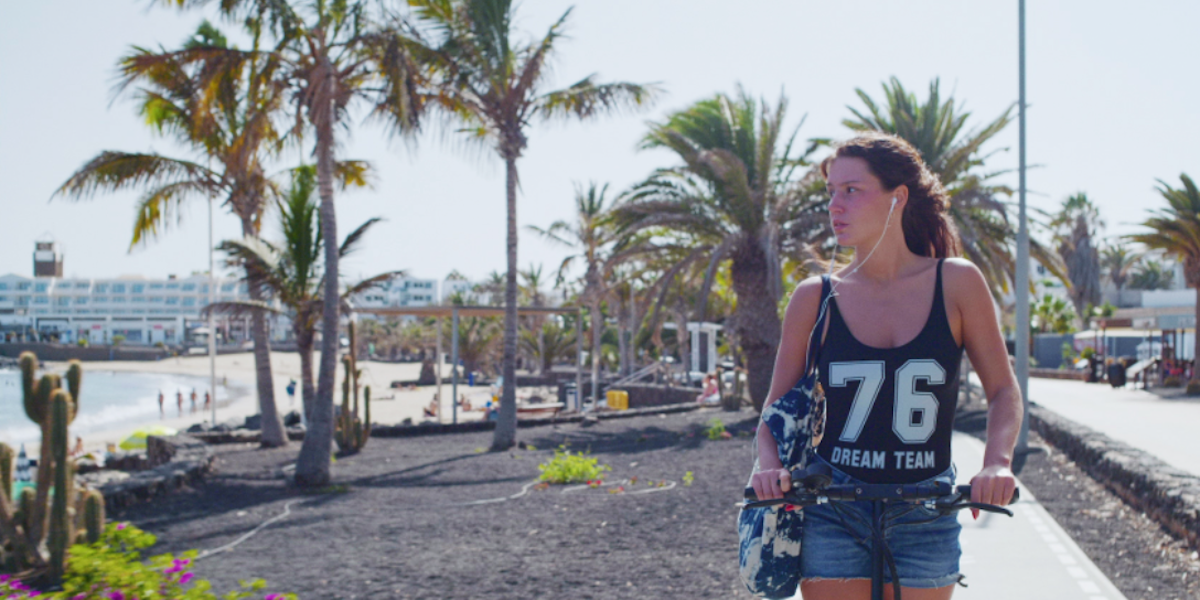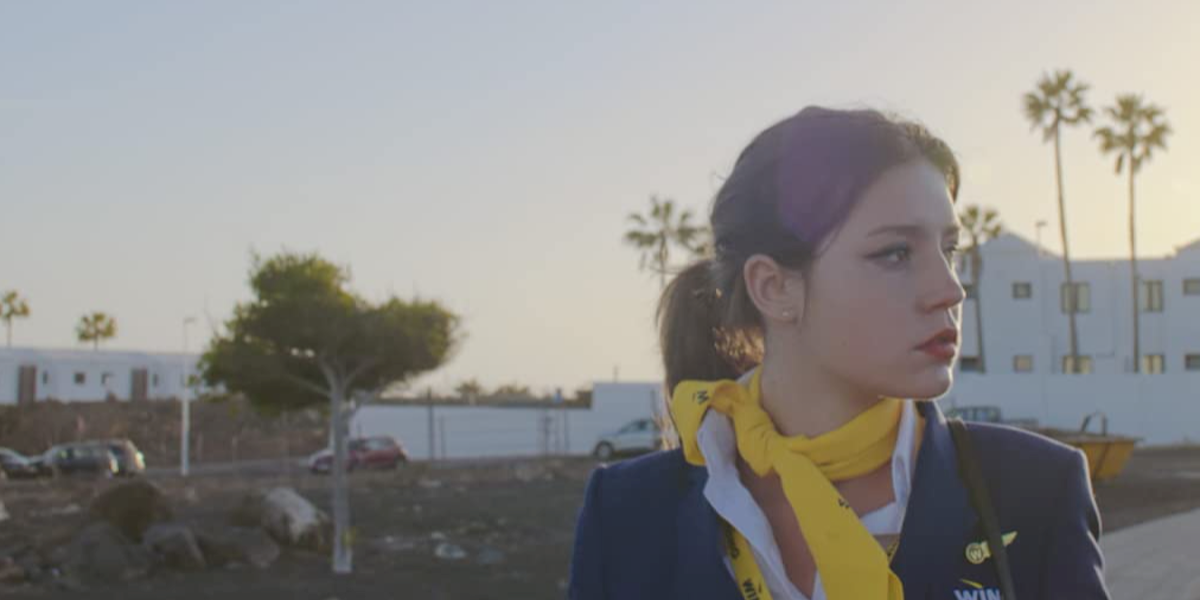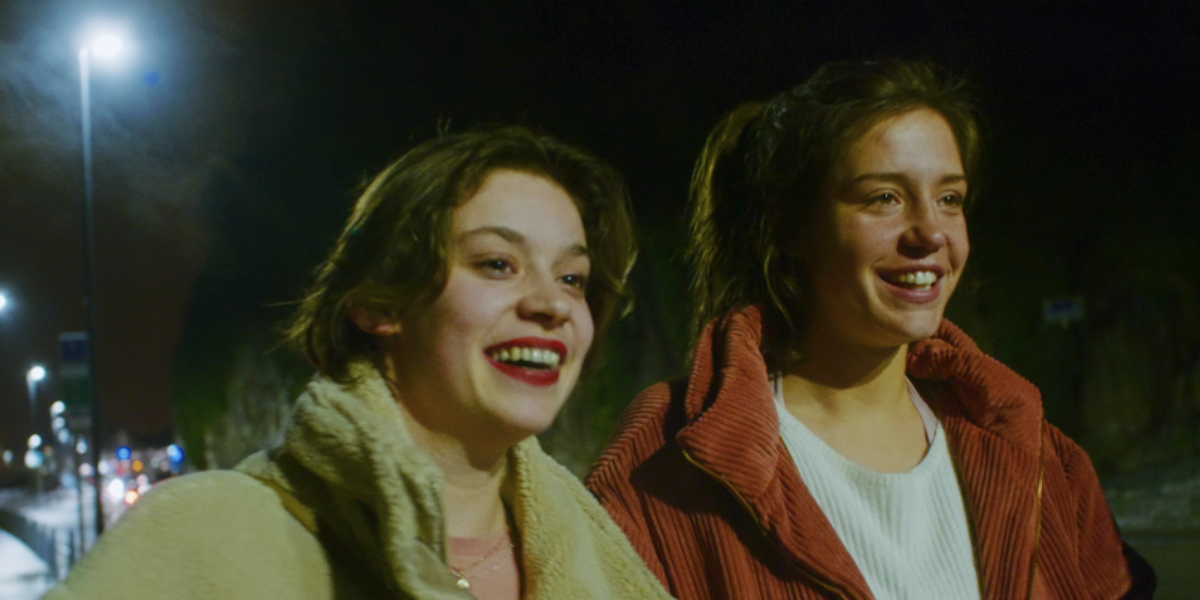By day, Cassandre Wassels (Adèle Exarchopoulos) in the 2021 film Zero Fucks Given is a hardworking, friendly flight attendant for a low-budget airline called Wing, where she’s been working for almost three years. By night, she numbs the pain of work by bouncing from dating apps to parties to falling asleep on the beach in Lanzarote, where she lives with her other Wing colleagues. While on the surface it might seem like Cassandre’s life has become this endless cycle by her own doing, it’s later discovered in the film that she’s running from a painful past. However, there is a larger force at hand that, throughout this Belgian film staring Alexandre Perrier and Mara Taquin, starts to play a bigger role in the eventual pitfalls of Cassandre’s career and personal life.
The film, from writer-director duo Emmanuel Marre and Julie Lecoustre, is not only a masterclass in character, it is a stunning, intimate examination of a young woman fleeing from herself as she’s pushed to her limit by the company’s intense grind. Since its 2021 release, the film has received widespread critical acclaim, including a win and two nominations at Cannes Film Festival. Thanks to a blisteringly real performance from the magnetic Exarchopoulos, brilliant camera work, and razor-sharp dialogue packed with subtext, the trio bring a story to life that highlights the consequences that arise with corporate greed.
From the opening shot of the film, a day in Cassandre’s life as a flight attendant is established. She listens with a group of colleagues as her manager gives them the run-down of the day before their next flight. The manager’s voice is monotonous as she gives the flight attendants a long lecture about pushing sales. Slowly, the camera pushes in on Cassandre’s face as her eyes glaze over. As we come to realize that Cassandre is a warm and hospitable person, it makes sense that from the outset, she is attempting not to lose interest in the most emotionally detached part of her job. In fact, the first time we even see Cassandre with her colleagues on the plane a few moments later, the shot is not of the flight attendants visually demonstrating what to do in the case of an emergency or serving coffee to passengers. It’s of one of her colleagues holding up duty-free boxes of perfume in a methodical, clinical way, and with a vacant expression.
Not only does this illustrate the mundanity that large corporations can breed in a job, through this emphasis in material goods Marre and Lecoustre illustrate that Wing’s employees are not just flight attendants: they’re salespeople. In between seat checks, Cassandre frequently checks her phone frequently to keep track of her daily targets, a high score being critical for her to stay in her manager’s good graces. Earning money for the company is at the forefront of their job. Of course, this is the reality of how budget airlines survive, but as Wing keeps pushing Cassandre to the brink, the reality of the corporation’s exploitative nature becomes more and more clear. Corporate greed can often force workers to be looked at commodities, instead of people.
As Cassandre deals with customers, and as the film brings us to the most paramount, central turning point, another issue that is highlighted with corporate greed is how Wing forces Cassandre to detach herself from her own, instinctive sense of empathy. This is shown rather subtly in one of the first scenes, when Cassandre is selling perfume. A passenger (Marie-Jeanne Cara) makes small talk with her. She tells Cassandre, “The perfume defines exactly who you are.” Cassandre responds, “That’s why you should try it.” While Cassandre is incredibly friendly and good with people, she quickly realizes that every one of these casual interactions she has must spinned in some way to push a sale.
In a scene shortly after, this forced detachment of empathy is shown in a slightly more explicit way. The camera doesn’t even reveal Cassandre as she deals with a frustrated customer (Veroline Vanderbeek) at the Wing desk in the airport. The customer, who presumably missed her flight, desperately pleads to Cassandre that she needs to make the flight because it’s her brother's birthday. Cassandre explains to her that she has no choice but to pay, to which the customer pleads that she’s out of money. The camera stays on this passenger as we see the sinking realization on her face that she might not see her family because she can’t afford to. Through this specific camera choice, it’s clear that despite Cassandre’s kind intentions, she has been conditioned to remove herself from her own emotions. In this scene, she becomes a disembodied, corporate voice with no face or name attached, illustrating how cold corporations can mold their employees to be.
When Cassandre moves up the ladder at Wing to a higher position, there’s a striking moment during her training where her managers ask her to smile for 30 seconds while they record her to evaluate her level of on-board friendliness. As this long take progresses, Cassandre’s smile starts to fade. She fights back tears, and her managers tell her, “All those emotions you have, you need to leave it behind”. They continue, “Don’t think about your personal life, nobody cares about your personal life.” The managers are forced to condition this mindset in Cassandre: not only does the corporation not care about her, but nobody on the flight will either. Later, they even tell her, “The uniform is the wall between you, your emotions, and what's going on.” Even though they’re delivered through a warm and friendly voice, Marre and Lecoustre use these piercing lines of dialogue to further heighten the darkness of corporate greed.
This dark aspect of corporate greed is shown the most brilliantly, however, at the midpoint of the film, which becomes a defining moment for Cassandre as she must choose between her own values and her career. In this scene, Cassandre argues with a passenger (Dorica Salagor), who insists on sitting by the window, despite her seat assignment being in a different place. After Cassandre does her routine checks, she spots the passenger again and takes a minute to apologize to her for the tense moment earlier. Although there’s a language barrier (the passenger speaks to her Romanian, and Cassandre responds in English), she opens up to Cassandre about leaving her home country and her family for an operation overseas. Cassandre comforts the crying woman, and offers to buy her a drink. With her own card, she purchases a small bottle of liquor from the flight’s menu. Shortly after, she’s called in by her base supervisor, where he essentially fires her for the incident. Again, the camera slowly pushes in on a confused Cassandre as she tries to make sense of Wing’s decision. It becomes clear through this sequence of events, and in the emphasis on the performance from a perplexed Exarchopoulos, that one of the problems with corporate greed is that it rewards a lack of empathy, and can punish those for showing any.
Finally, the last, dark aspect of this specific issue that Marre and Lecoustre highlight is how numbing the corporate grind can be. The slow, heavy synths accompany long shots of her at the airport, either walking, or bored, or searching for something fun and exciting within her routine. In an early scene, Cassandre and her colleague sneak mini bottles of vodka to drink with their orange juice when passengers aren’t watching. The director's cut between Cassandre partying and bouncing around from hookups to drug induced nights to waking up at random hours under the blistering sun. The directors also use brilliantly written, subtextual dialogue to illustrate her growing apathy. Cassandre at one point says to a potential love interest, “I’d prefer a ‘let’s go home together’ than a ‘i’m looking for love’”. Cassandre cruises through life without looking for permanence and commitment, completely numbed not only by her trauma, but by the intense expectations from work.
Moreover, it becomes clear how numbing the entire job is, not just physically, but in Cassandre’s mindset as well. In an introduction to the film for Mubi, Lecoustre writes, “For us, Zero Fucks Given is primarily a film about being attached and detached.” This detachment is made clear when, at one point, an alternative to Cassandre’s ideas is presented to her. A group of protestors outside the airport try to bring attention to her and her colleagues about how poorly Wing treats their employees. They ask her, “If you’re sick, do you get paid?” She responds, slightly laughing, “I try not to be sick”, and then later tells them as she’s about to run off to make her flight, “I don’t really have time to make the revolution.” Her complete indifference is a product of the urgency to make money, which is a consequence of a society driven by large corporations.
While corporate greed breeds these subtle complexities and horrors on an individual level, there is an element of hope within Cassandre’s journey. Cassandre’s Instagram handle is “Carpe Diem”, which feels like it cements an underlying mindset within her character: to enjoy life and live a day at a time. The ending seems to solidify this too. After Cassandre confronts and begins to come to terms with her troubled past, she ends up traveling to a place she always wanted to go. It feels like a hopeful moment, and one where Cassandre will finally find her purpose.




